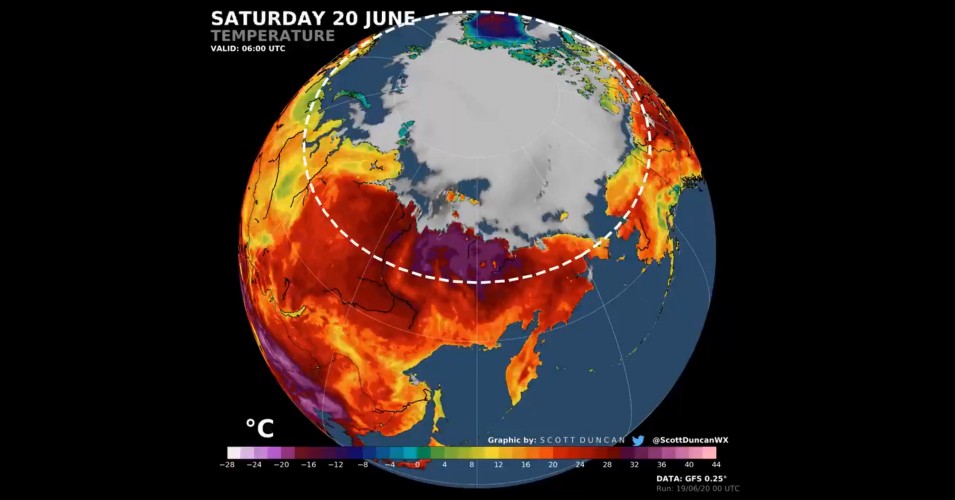Environment
Arctic Reaches Hottest Temperature Ever Recorded as “Relentless” Heatwave and Siberian Fires Rage
A Siberian town within the Arctic circle recorded a shocking temperature of 100.4°F (38°C).

(TMU) – We often joke about how in a year that’s brought us to the brink of World War III, plunged us into a global pandemic and economic collapse, deluged whole regions in plagues of locusts, and brought about other cataclysmic shocks, the next months could bring us further catastrophes ripped from the pages of biblical scripture and science fiction.
And that may be the case – but were also getting new signs that the world continues to shatter records in terms of the hottest temperatures ever recorded in the Arctic region.
Such was the case over the weekend as a Siberian town within the Arctic circle recorded a shocking temperature of 100.4°F (38°C), 32 degrees beyond the normal high temperature.
We are in a relentless Arctic #heatwave – Siberia is literally on fire right now and it's set to continue.
Temperatures will comfortably exceed + 30 °C within the Arctic Circle over the next 10 days at least. It is a staggering + 20-25 °C warmer than it should be…
[THREAD] pic.twitter.com/J9opJLIaIw
— Scott From Scotland (@ScottDuncanWX) June 19, 2020
On Saturday, temperatures skyrocketed in the town of Verkhoyansk, which lies 3,000 miles east of Moscow and is located at 67.5°N latitude, a point further north than Fairbanks, Alaska.
The temperature, if verified, could be registered as the hottest temperature ever recorded in Siberia and the hottest temperature recorded north of the Arctic circle, reports CBS.
On Friday, the city of Caribou, Maine, also tied its all-time record of 96°F while the temperature in the 90s persisted through the weekend.
The reason Miami has only reached 100 once is because it’s near the ocean. So this is not an apples to apples comparison, because land heats faster than water, and the sea breeze cools Miami down, but it is an interesting fact that always seems hard to believe.
— Jeff Berardelli (@WeatherProf) June 21, 2020
To put this into a broader perspective, the tropical climate of Miami – known well for its hot, humid summers – only reached 100°F on a single day since the city began keeping records of the temperature in 1896.
In a tweet, CBS weatherman Jeff Beradelli described the news as ‘alarming’, writing: “Likely the hottest temperature ever recorded in the Arctic happened today.
“What’s happening in Siberia this year is nothing short of remarkable. For perspective, Miami has only reached 100F (38C) once on record.”
In a separate tweet, Beradelli added: “The reason Miami has only reached 100 once is because it’s near the ocean.
“So this is not an apples to apples comparison, because land heats faster than water, and the sea breeze cools Miami down, but it is an interesting fact that always seems hard to believe.”
Temperatures reaching 100 degrees in or around the Arctic circle are nearly unheard of. While the record still requires verification, back in 1915 the current record for the hottest Arctic temperature was set by Prospect Creek, Alaska, which recorded a temperature of 100°F (38°C). In 2010, a town lying a few miles south of the Arctic circle reached 100.
Satellite image today showing extensive smoke and fires east of Verkhoyansk. Blue coloured ice in Laptev Sea is an indication of melting ice and there is lots of open water visible in the East Siberian Sea. pic.twitter.com/BemW0fccrq
— Kilkenny Weather (@kilkennyweather) June 20, 2020
A number of fires are ranging around the Arctic region due to the hot-dry conditions prevailing in the region, with smoke being seen across thousands of miles in satellite imagery.
Parts of the Siberian region have been plunged into an extremely abnormal heatwave since around January, with the extraordinary heat cresting in western Siberia at about 18 degrees Fahrenheit above normal in May for the month.
Robert Rohde, lead scientist at climate data analysis non-profit Berkeley Earth, wrote in a tweet last week:
“Five months into 2020, and there has been a huge, record-breaking warm anomaly over Asia … If 2020 goes on to be the warmest recorded year, despite the lack of an El Niño event, then this year’s monstrous Asian anomaly will be the reason why.”
Typos, corrections and/or news tips? Email us at Contact@TheMindUnleashed.com
